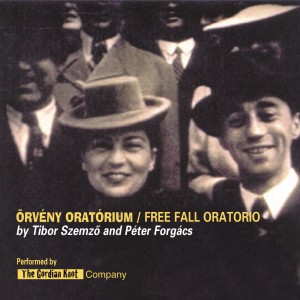| by Tibor Szemző and Péter Forgács CD 2000, FOB 021, Authors publication |
||
| 1. Szeged introduction 4’53” 2. Under the circumstances… (1938) 1’51” 3. In the chamber of press (1938/XVI.) 3’39” 4. That is regarded to be Jewish (1939/i) 1’33” 5. Under the application of this current Law (1939/IV./1-2) 4’21” 6. Black Eye paraphrase interlude 3’15” 7. As civil servants (1939/IV./5) 1’34” 8. Jews shall not be (1939/IV./10-11-12) 2’23” 9. Salvage 3’19” 10. MUSZ 3’06” 11. The Law Maintains (1942/ind.) 2’24” 12. Szeged, The Lengyel Family 3’13” 13. An Offense is Committed (1941/XV./15) 3’21” 14. Prices 1’34” 15. Nor for transport (1944/1240) 2’17” 16. As of the enforcement of this decree quasi canon 1’56” 17. less than ten thousand inhabitants (1944/1610) 4’30” 18. The distinguishing insignia (1944/1830) 1’58” An Offense is Committed – Prices 5’54” |
||
| As of the enforcement… – mp3 extract 1’50”
Working in tandem, Tibor Szemző and Péter Forgács have long been presenting us with the documents of a lost world. Their Private History is in fact very public: few of the events or pictures fail to afford identification with oneself, ones own ancestors, family photographs, unwritten memories or stories. What is true about the pictures is also true about the sound: the music now concretely, now remotely, but in every instance, generates the feeling of an objet trouvé. Aesthetics is brought about not so much by intention; rather, it comes as a result of the joint efforts of the audience on the receiving end, and the creator providing the conditions of reception. Only this way can we view as a film such intimacy which would appear improper even to a private company of ones closest friends; and only this way can something become music that would never stand up to being printed.László VidovszkyThis record is not for commercial sale. Sung in Hungarian Recorded at the Fodderbasis and Mirage Sound Studio 1992-96 by László Hortobágyi, Performed by The Gordian Knot Company FREE FALL / THE PETŐ SAGA When all the Jews of the Nazi occupied Europe vanished, the Hungarian Jewish community was still intact in the early spring of 1944. What happened with the Hungarian Jews, in a country which was a close ally to the third Reich since the beginning of the war. This story has been already told in several ways. One could hear the painful confessions of innocent peoples’ death marches, and see thousand meters of provoking film images of the nazi science and of the bureaucratic mass homicide system. The Hungarian Holocaust – a private history saga – is recited by Free Fall Oratorio. The homemovies of Mr. György Pető is the magic sources of the Free Fall Oratorio. Mr. Pető was a talented violin player, a banker – class lottery businessman in the southern Hungarian City Szeged. He survived the Jewish Forced Labor and the Soviet POW camp. The text of Free Fall Oratorio is based on Pet family memories, historical documents and the Hungarian Jewish Laws (1938-1944). The live concert oratorio follows the film created by the authors. “Awards of Free Fall” Documentary 1996/97 (75 min.): ‘BUDAPEST Film Week’ 1997: the ‘Best Short and Experimental film’ prize |
||
